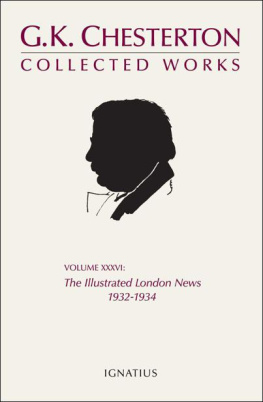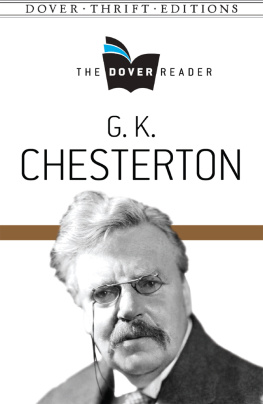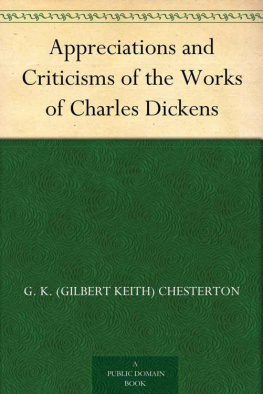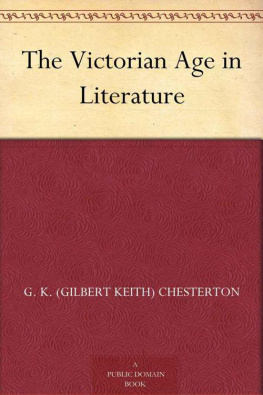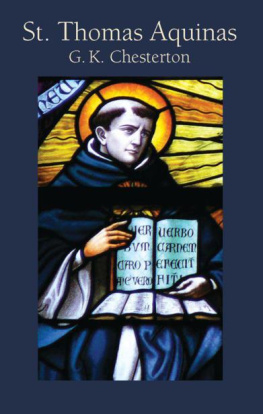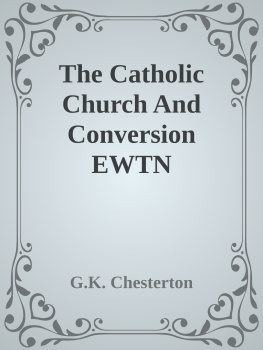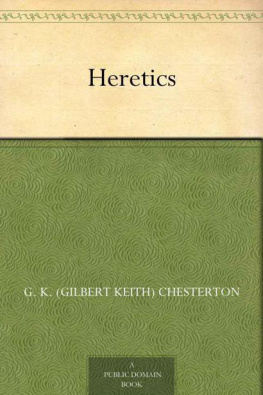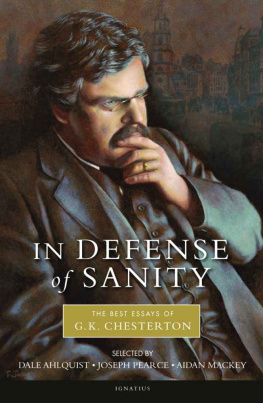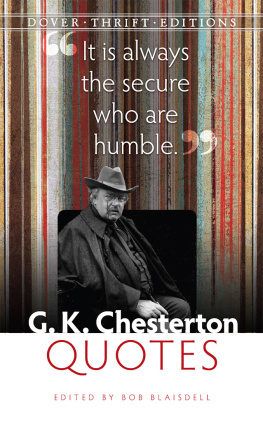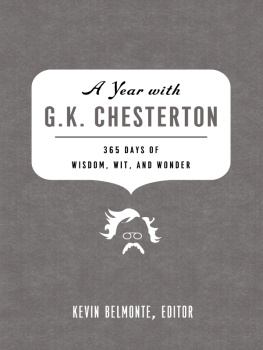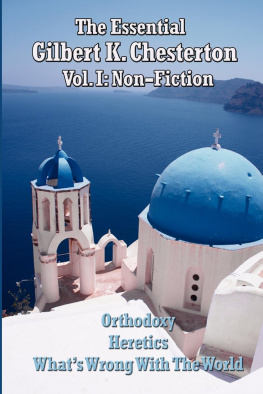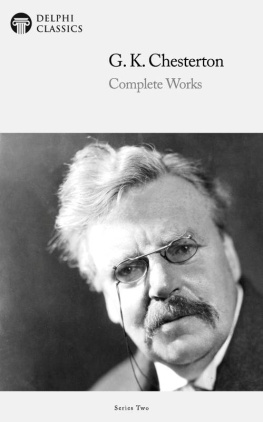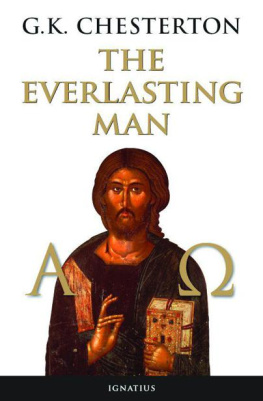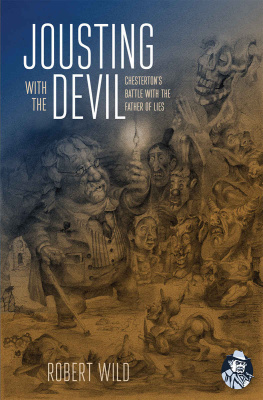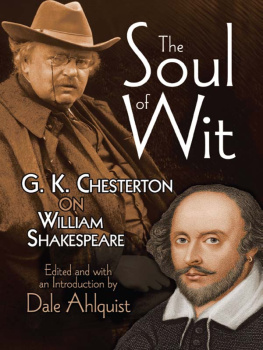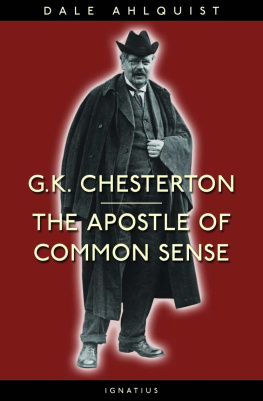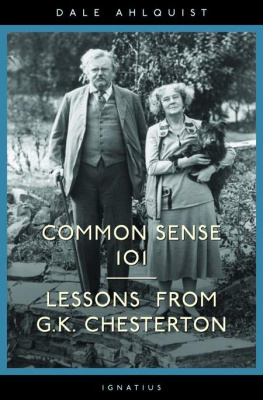THE COLLECTED WORKS OF
G. K. CHESTERTON
XXXVI
THE COLLECTED WORKS OF
G. K. CHESTERTON
XXXVI
The Illustrated
London News
1932 - 1934
Edited by Lawrence J. Clipper
General Editors: George J. Marlin,
Richard P. Rabatin, and John L. Swan
IGNATIUS PRESS SAN FRANCISCO
2011 Ignatius Press, San Francisco
All rights reserved
ISBN 978-0-89870-838-7 (HB)
ISBN 978-0-89870-839-4 (PB)
Library of Congress Control Number 85-81511
This new edition
of Chestertons articles is
dedicated to Frank Petta,
lifelong Chestertonian, teacher,
inspirer of friends, and
inspiration for this work .
The dates used in this volume are from the American edition of the Illustrated London News which normally appeared two weeks later than those of the English edition.
CONTENTS
1932
Jan. 2
Jan. 9
Jan. 16
Jan. 23
Jan. 30
Feb. 6
Feb. 13
Feb. 20
Feb. 27
Mar. 5
Mar. 12
Mar. 19
Mar. 26
Apr. 2
Apr. 9
Apr. 16
Apr. 23
Apr. 30
May 7
May 14
May 21
May 28
June 4
June 11
June 18
June 25
July 2
July 9
July 16
July 23
July 30
Aug. 6
Aug. 13
Aug. 20
Aug. 27
Sept. 3
Sept. 10
Sept. 17
Sept. 24
Oct. 1
Oct. 8
Oct. 15
Oct. 22
Oct. 29
Nov. 5
Nov. 12
Nov. 19
Nov. 26
Dec. 3
Dec. 10
Dec. 17
Dec. 24
Dec. 31
1933
Jan. 7
Jan. 14
Jan. 21
Jan. 28
Feb. 4
Feb. 11
Feb. 18
Feb. 25
Mar. 4
Mar. 11
Mar. 18
Mar. 25
Apr. 1
Apr. 8
Apr. 15
Apr. 22
Apr. 29
May 6
May 13
May 20
May 27
June 3
June 10
June 17
June 24
July 1
July 8
July 15
July 22
July 29
Aug. 5
Aug. 12
Aug. 19
Aug. 26
Sept. 2
Sept. 9
Sept. 16
Sept. 23
Sept. 30
Oct. 7
Oct. 14
Oct. 21
Oct. 28
Nov. 4
Nov. 11
Nov. 18
Nov. 25
Dec. 2
Dec. 9
Dec. 16
Dec. 23
Dec. 30
1934
Jan. 6
Jan. 13
Jan. 20
Jan. 27
Feb. 3
Feb. 10
Feb. 17
Feb. 24
Mar. 3
Mar. 10
Mar. 17
Mar. 24
Mar. 31
Apr. 7
Apr. 14
Apr. 21
Apr. 28
May 5
May 12
May 19
May 26
June 7
June 9
June 16
June 23
June 30
July 7
July 14
July 21
July 28
Aug. 4
Aug. 11
Aug. 18
Aug. 25
Sept. 1
Sept. 8
Sept. 15
Sept. 22
Sept. 29
Oct. 6
Oct. 13
Oct. 20
Oct. 27
Nov. 3
Nov. 10
Nov. 17
Nov. 24
Dec. 1
Dec. 8
Dec. 15
Dec. 22
Dec. 29
1932
J ANUARY 2, 1932
How Gray Wrote The Elegy
A newspaper appeared with the news, which it seemed to regard as exciting and even alarming news, that Gray did not write the Elegy in a Country Churchyard in the churchyard of Stoke Poges, but in some other country churchyard of the same sort in the same country. What effect the news will have on the particular type of American tourist who has chipped pieces off trees and tombstones, when he finds that the chips come from the wrong trees or the wrong tombstones, I do not feel impelled to enquire. Nor, indeed, do I know whether the new theory is proved or not. Nor do I care whether the new theory is proved or not. What is most certainly proved, if it needed any proving, is the complete lack of imagination, in many journalists and archologists, about how any poet writes any poem.
In such a controversy it is implied, generally on both sides, that what happens is something like this. The poet comes and sits on a tombstone, or wherever he was supposed to sit, in the one and only churchyard of Stoke Poges, or whatever place be the rival of Stoke Poges. He hears the Curfew; and there is a dreadful doubt and dispute about whether anybody sitting among the tombs of Stoke Poges can hear the Curfew, which does really ring from Windsor, though I imagine it sounds pretty much like any other bell at evening. Then the poet produces a portable pen and ink, preferably a large quill and a scroll (the poet in question lived before the time of fountain-pens), and writes down the first line: The curfew tolls the knell of parting day. Then he looks round to make quite sure that there are some lowing herds winding over that particular lea, that the ploughman is present and doing his duty in plodding homeward his weary way, and that all the other fittings are in the offing. Later, he will have to insist peremptorily on an ivy-mantled tower being in the immediate neighbourhood, inhabited by an (if possible) moping owl. It will not be the only owl involved in the business. If there are not all these correct conditions provided on the spot, he will not be able to write the Elegy. If, on the other hand, they are all there and everything has been properly provided, he will then write the whole of the Elegy, steadily, right through, and not roll up his scroll or rise from his tombstone until he has left the unfortunate young man in the poem finally safe in the bosom of his Father and his God. Then he will go home to tea; and I should imagine he would need it, after so prolonged and sustained a literary effort achieved in such damp and clammy conditions. That, with very little exaggeration, is what is really suggested by those who talk about Gray writing the poem in this place or that place, and under this or that condition of local colour.
Now, I should have thought that anybody would know that poetry is not written like that. But perhaps, in this case, even a bad poet is better than a good critic. Anybody who has ever written any verse, good, bad, or indifferent, will know that calculations of this sort are calculations about the incalculable. Gray might have written the poem, or any part of the poem, in any place on the map; he might have visited the New Stoke Poges or the Old Stoke Poges, or quite probably both, or possibly neither. But, if I may be allowed to pick out one thread of speculation from a thousand threads of possibility, I would suggest that the Elegy in a Country Churchyard, even if it did refer to one particular churchyard, is very likely to have been begun, continued, and ended rather like this:
Mr. Thomas Gray was sitting one evening in a coffee-house; let us hope a coffee-house that did not confine itself to coffee. Something or other, a fiddle or a few glasses of wine, or a good dinner, had thrown him into a mood of musing, of pleasant musing, though touched with a manly and generous melancholy. His thoughts turned round and round, as they do at such times, the tantalising old riddle of what we really feel about life and death; about the toy God gave us which is beautiful and brittle, yet certainly not trivial. He said to himself: After all, who doesnt really feel that it really matters, with all its botherations?... A queer business... pleasing... anxious.... Then something stirred quicker within him, and he said to himself, in warm poetic emotion
For who tytumpty tumpty tumpty tum,
This pleasing anxious being eer resigned.
Then his impulse gathered speed and power; and he struck the table and said the next line straight off
Left the warm precincts of the cheerful day.
He said that line several times. He liked it very much. Then it was almost a matter of form, certainly a matter of facility, to put the tail on the verse
Nor cast one longing, lingering look behind.
Then he got up and put on his hat. He left the warm precincts of the cheerful coffee-house, and went home and forgot all about it.
Next page
